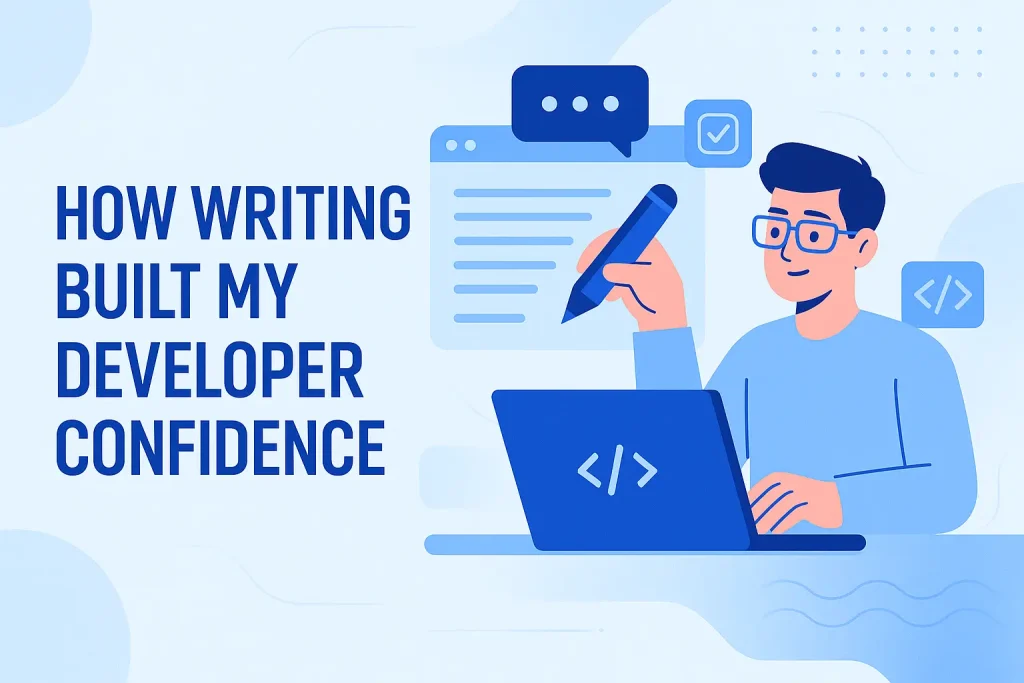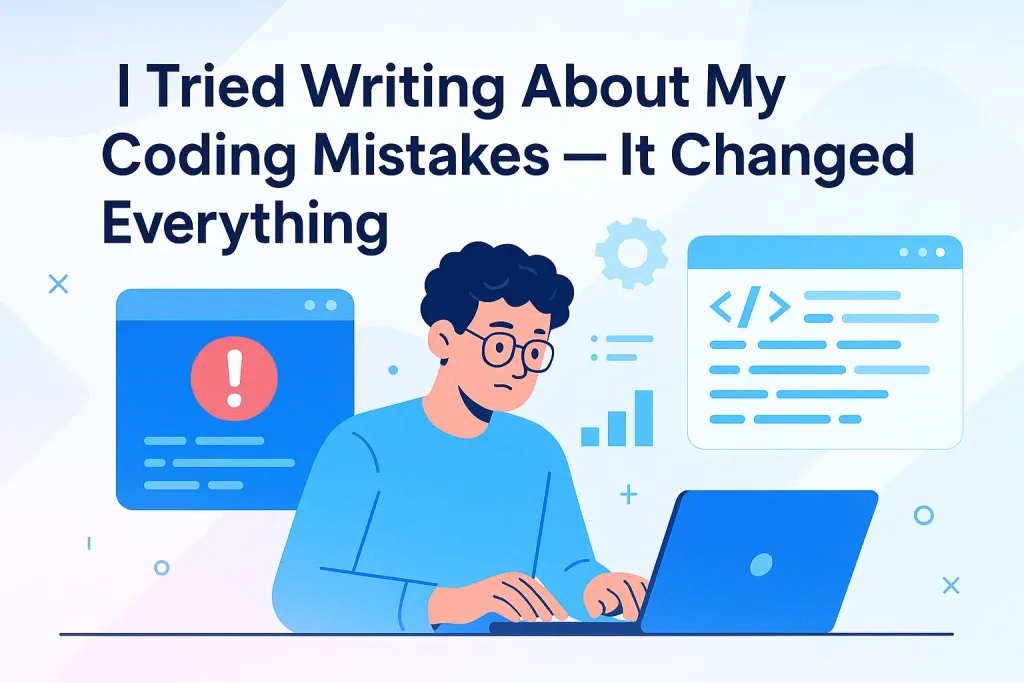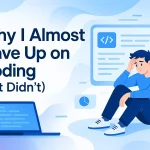By Yasfa Yasmin
Introduction: I Wasn’t Always Confident
So here’s the real deal: I used to feel like a total mess every time I made a coding mistake. Like seriously, one wrong semicolon or a missed closing div tag, and I was spiraling into self-doubt. I thought real developers didn’t make these silly mistakes. But spoiler alert — they do. And something unexpected happened when I started doing one simple thing:
I started writing about my coding mistakes.
No, not tweeting them or complaining in group chats. I started journaling them, writing detailed notes, and eventually blogging them. That one decision literally changed how I learn, how I solve bugs, and how I connect with other developers.
Let me take you through my journey and the big lessons I learned.
Why I Started Writing About My Mistakes (And Not Just Fixing Them)

At first, I only wanted to document issues so I wouldn’t repeat them. But what started as a personal debug journal soon became a treasure chest of growth. Here’s what I discovered:
1. Writing Made Me Slow Down (In a Good Way)
When I paused to write about an error, I wasn’t just mindlessly pasting solutions from Stack Overflow. I was reflecting:
- What caused this?
- Why didn’t I see it earlier?
- What could I do better next time?
This process rewired how I approached problems. Instead of treating bugs like annoying speed bumps, I started seeing them as clues.
2. It Was Like Debugging My Brain
Honestly, writing is like putting your thoughts under a microscope. The more I wrote, the more I realized my assumptions were often the problem — not the code.
I once spent hours fixing a JavaScript async bug, only to realize I misunderstood the event loop. Writing out what I thought was happening vs. what was actually happening revealed the gap. Boom. Instant clarity.
3. It Helped Me Teach Myself
You know what’s wild? When you write to explain something (even to yourself), you’re actually teaching it. And teaching is one of the fastest ways to learn. It forced me to research more deeply and explain things clearly.
A Real Example: My Async/Await Nightmare
Let me share one of the mistakes that still haunts me (but taught me the most):
I was building a simple tool that fetches data from an API and displays it. Easy stuff, right?
async function fetchData() {
const data = await fetch('https://api.example.com/data');
console.log(data.json());
}
The issue? I kept getting a Promise object in my logs instead of the actual data.
The mistake: I forgot to await data.json():
console.log(await data.json()); // Correct way
Writing about this taught me:
fetch()returns a Promise..json()also returns a Promise.- Chaining them incorrectly leads to Promise inception. 😅
After writing it out with explanations, I finally understood async/await properly.
How Writing Built My Developer Confidence

When you mess up a lot, imposter syndrome sneaks in. But here’s the twist:
When I wrote about my bugs, I started to feel proud.
Not because I made fewer mistakes, but because I understood them. I could track my growth. I saw how far I’d come.
I also started sharing them in dev communities — and the response was amazing. People thanked me for writing what they were too scared to admit.
It built my confidence not just in coding, but in learning.
My “Coding Mistake Journal” System
Okay, so how do I actually do this in practice? Here’s my personal journaling method:
| Step | What I Do |
|---|---|
| 1. Reproduce the Bug | Copy the error and the context where it happened |
| 2. Describe What I Thought Was Happening | Write what I expected the code to do |
| 3. Break It Down | Step-by-step breakdown of what actually happened |
| 4. The Fix | Document the actual solution and why it works |
| 5. The Lesson | Write the core takeaway in simple words |
I keep these notes in Notion, sometimes I even blog them (like this one!).
Unexpected Wins From Writing About Mistakes
Let me hit you with a few cool things that happened because of this habit:
I Got Better Job Interviews
In interviews, people would ask how I handle bugs. I had stories. Real ones. Instead of giving generic answers, I could walk through a specific mistake and how I handled it. Interviewers loved it.
I Built Real Developer Community Connections
When I blogged my mistakes, I got replies like, “OMG I made this exact same bug!” and “Thanks for this!” It started convos, DMs, collabs.
My Code Got Cleaner
Because I understood my old bugs, I started writing defensive code. More comments, better naming, fewer assumptions. Future-me was thankful.
I Became a Better Googler
Writing about bugs improved my debugging process. I learned how to phrase better search queries. Like:
“JavaScript fetch promise inside async function returns undefined”
Boom — better Stack Overflow hits.
Some Mistakes That Changed Me
Here are just a couple more coding goofs that made me stronger:
Off-by-One Loops in JavaScript
My loop kept skipping the last item:
for (let i = 0; i < items.length - 1; i++) { ... }
Why was I subtracting 1? No clue. Writing about it made me realize I was copy-pasting logic from a different problem. Rookie move.
Misusing useEffect in React
I put async directly into useEffect, like:
useEffect(async () => {
await fetchData();
}, []);
Which led to warnings and weird behavior. Turns out, useEffect shouldn’t be async. You should define an async function inside instead.
Documenting this helped me really learn how React hooks work.
FAQs: Your Questions, Answered
Q: Do I need to be a good writer to do this?
Nope. You’re not writing a novel. Just explain what happened like you’re talking to a friend. Honest and simple is perfect.
Q: Should I make my journal public?
Totally your call. I started private. But when I shared, the feedback was positive. People respect vulnerability.
Q: What tools do you use?
I use Notion, Google Docs, and sometimes VS Code’s built-in Markdown for quick logs. Whatever’s handy.
Q: What if I’m embarrassed by how basic my mistake is?
Trust me, everyone makes basic mistakes. And you’ll forget them if you don’t write them down. Embrace it.
Final Thoughts: Mistakes Are My Superpower
Here’s the truth I’ve learned the hard way:
Mistakes aren’t a sign of weakness. They’re proof you’re learning.
Writing about them turns your stumbles into stepping stones. It transforms frustration into insight. It makes you a more mindful, confident, and connected developer.
So next time you break something? Don’t just fix it. Write it down. Reflect on it. Share it if you’re brave.
Because it just might change everything.
Thanks for reading! I’m Yasfa Yasmin, and I love building helpful tools and learning everything web dev. You can connect with me online or check out more of my posts if you enjoyed this one!



